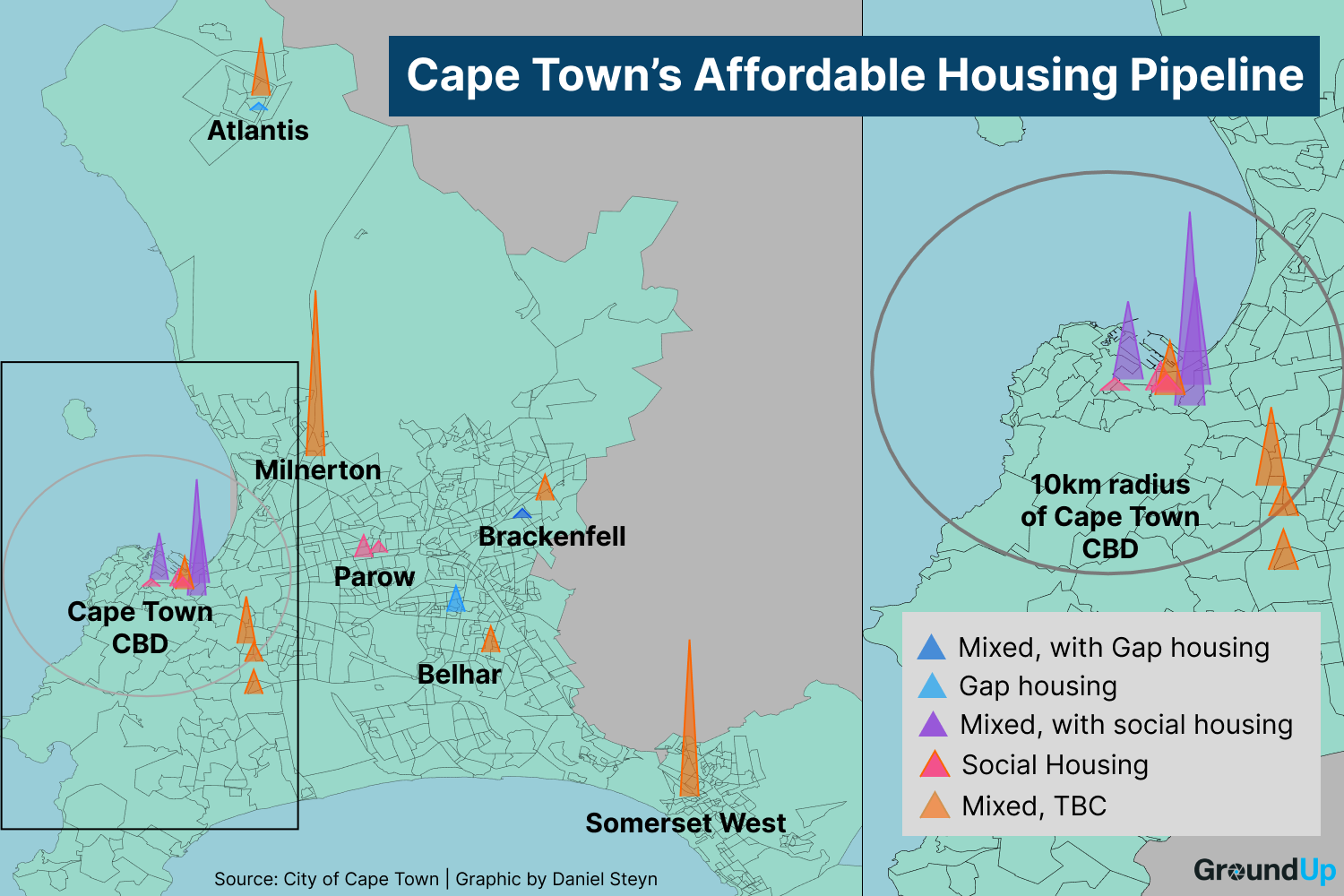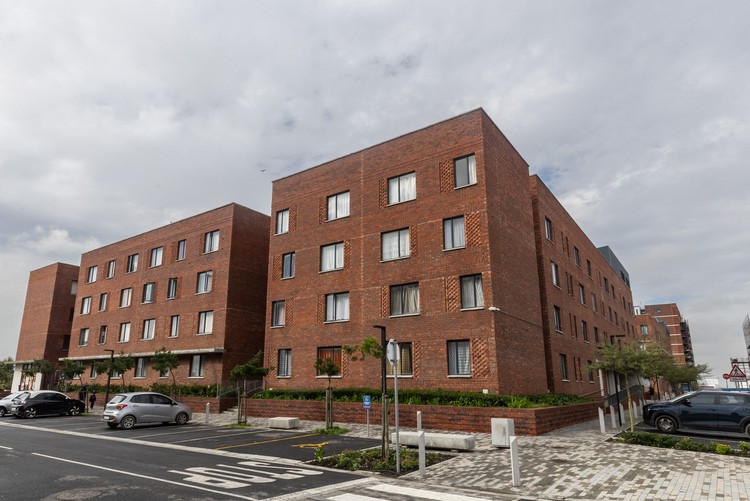Affordable housing without state subsidies – City of Cape Town says it will work
City plans to sell land to private developers at a discount
Conradie Park in Pinelands is being built on land previously owned by the Western Cape Government. It will create 3,500 homes, of which 1,715 will be state-subsidised affordable housing. More than 1,250 units have already been completed. Photo: Ashraf Hendricks
The City of Cape Town has promised to develop 12,000 affordable housing units targeted at households earning less than R32,000 a month. Many of these homes, the City believes, can be built without state subsidies. We asked how this would work.
Affordable housing can be either social housing, Gap housing, or open-market affordable housing. The 4,849 affordable homes built in Cape Town to date have been state-subsidised social housing. The City plans to build another 2,741 of these homes as well as 916 Gap houses, another form of state-funded housing.
But due to national funding constraints, the City will not be able to build all 12,000 of its promised affordable homes if it relies only on the state-subsidised social housing and Gap housing models.
Social housing and Gap housing are targeted at households earning less than R22,000 a month. Social housing developers receive once-off subsidies and use rental income to cover maintenance and security costs. Gap housing is subsidised by government grants so that houses can be made available for purchase at affordable prices.
But there is limited money available to subsidise these forms of affordable housing. The Social Housing Regulatory Authority (SHRA) has had budget cuts, delaying many social housing projects. Similar constraints exist with Gap housing.
There are also flaws in the social housing model. The once-off grants offered by the SHRA for social housing are often not big enough to achieve scale and they have not kept pace with inflation. This puts pressure on developers to find other sources of funding. Rising operating and maintenance costs are making it difficult for developers to cover their costs while keeping rentals affordable.
The City’s answer is to propose open-market affordable housing that does not rely on state subsidies.
Mayco member for human settlements Carl Pophaim said that to develop open-market affordable housing, the City plans to sell land to developers at discounted rates and sign an agreement with them to ensure that a certain number of open-market affordable homes will be built on the land.
These developments will likely be mixed-use, enabling developers to cross-subsidise the affordable housing units with higher-end open-market units and, in some instances, retail or office space. For example, a cross-subsidisation model has been proposed for a site in Green Point which the City plans to release.
But Pophaim acknowledged that the high price of property in the City’s urban centres poses a challenge, even with the City’s discounts.
Jens Horber, a researcher at housing activist group Ndifuna Ukwazi, agrees that cross-subsidisation from market-rate or higher-end affordable units is an “increasingly common practice”, and it is the “only viable alternative” to get projects implemented in the face of funding constraints.

The City has plans for at least 12,000 affordable housing units. Many of these will be open-market affordable homes. For an analysis of the City’s pipeline, read our explainer.
Keeping it affordable
State-subsidised social housing developments are regulated by the SHRA under the Social Housing Act. Rental amounts are capped at 33% of household income with a maximum of R7,326 a month.
However, the City’s open-market affordable housing will not fall under the act.
“The City is considering mechanisms for monitoring and ensuring that affordability is maintained,” said Pophaim.
Pophaim said rentals for these homes should not exceed 30% of household income. This translates to R9,600 for a household earning R32,000. The City is currently busy with financial feasibility modelling, which in “due course will inform the guidelines for this market segment”.
He noted that based on the City’s financial modelling for mixed developments, the difference in price between affordable units and other open-market units is “not significant … which in some instances creates opportunities for upward mobility for the households”.
Means-testing of potential tenants will be done by the developers, he said.
What is affordable?
Pophaim said the City’s household income target range for affordable housing (up to R32,000 a month) is based on those of the Banking Association of South Africa (BASA) and the Financial Sector Code Affordable Housing Standards”.
But Horber points out that at least 75% of households in Cape Town earn less than R18,000, according to the 2011 Census.
The 2022/23 Income and Expenditure Survey by StatsSA shows that half of households in the city earn below R20,700 a month.
“The City must make sure that affordable housing not only caters to the upper end of the threshold,” said Horber.
Another concern raised by activists is that the open-market affordable housing model might benefit single young professionals over families. An individual earning R32,000 a month, for example, is in a completely different financial position to a household of three or more people with the same household income.
For an individual earning R32,000 a month, a studio apartment at R9,600 a month might be affordable. But it would not be suitable for a family.
Asked how the City would ensure larger households also benefit from open-market affordable housing, Pophaim said the City is “developing the framework” to “take into consideration the allocation of opportunities to families”.
Housing activists have for years called on the City to complete its Affordable Housing Policy, especially when it is considering selling land to private-sector developers. The policy, still in the making, is expected to provide guidelines on how open-market affordable housing will be allocated and regulated.
This is the second in a series of two articles on affordable housing in Cape Town. Read the first article: Explainer: affordable housing in Cape Town
Support independent journalism
Donate using Payfast

Don't miss out on the latest news
We respect your privacy, and promise we won't spam you.
Next: Minister of Social Development promises probe into disability grant applications
Previous: Judge Mbenenge inquiry: I wanted a romantic relationship
© 2025 GroundUp. This article is licensed under a Creative Commons Attribution-NoDerivatives 4.0 International License.
You may republish this article, so long as you credit the authors and GroundUp, and do not change the text. Please include a link back to the original article.
We put an invisible pixel in the article so that we can count traffic to republishers. All analytics tools are solely on our servers. We do not give our logs to any third party. Logs are deleted after two weeks. We do not use any IP address identifying information except to count regional traffic. We are solely interested in counting hits, not tracking users. If you republish, please do not delete the invisible pixel.

